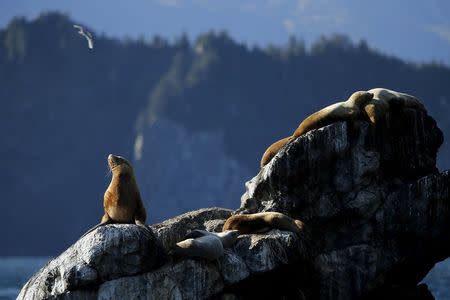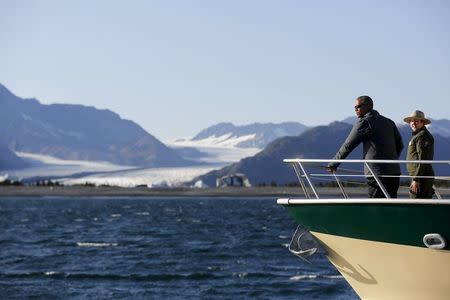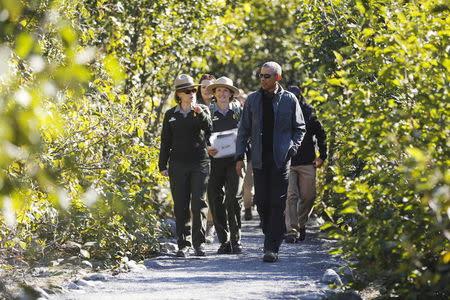Obama: Shrinking Exit Glacier a powerful sign of warming climate
By Roberta Rampton SEWARD, Alaska (Reuters) - President Barack Obama walked down a winding wooded path, past a small brown post marked "1926" and a glacial stream trickling over gravel that eons of ice have scraped off mountain peaks. He reached another post reading "1951", a marker for the edge of Alaska's Exit Glacier that year, and gazed up toward where the rock-rutted ice mass has since receded, a quarter mile away. "This is as good a signpost of what we're dealing with on climate change as just about anything," Obama told reporters near the base of the glacier. It was the signature moment of Obama's trek to Alaska, aimed at making the world pay heed to the damage already caused by rising seas, and demand global leaders reach a deal in Paris in December to curb climate-changing carbon emissions. Last year alone, the Exit Glacier melted and retreated 187 ft (57 m) toward the Harding ice field, which itself has lost 10 percent of its mass since 1950, mainly due to climate change. "It's spectacular," Obama said, glancing over his shoulder and pausing, as the cameras clicked. "We want to make sure that our own grandkids can see this." The main purpose of the Alaska journey is to create powerful images the White House will use to engage Americans. Obama on Tuesday taped an episode of NBC survival television show, "Running Wild with Bear Grylls," set to air later this year. Then he took a three-hour boat tour around Resurrection Bay to see the 12-mile- (19.3-km-) long Bear Glacier in the Kenai Fjords National Park, the longest of 38 glaciers moving from the Harding ice field. Bear Glacier has receded more than two miles during the last 15 years, with large chunks dropping into a lake at its base. Obama's boat paused at three points to let photographers capture him at the bow of a tourist boat looking at Stellar sea lions basking on a rock or gazing at the magnificent vistas. "The iceberg is sitting in the lake!" Obama shouted to reporters on a nearby boat during one photo opportunity. His three-day visit seemed to delight Alaskans, who lined streets to wave at his motorcade. "We get to showcase our piece of paradise to the president of the United States, and that means a lot to us," said Seward mayor Jean Bardarson. Obama was set to complete his tour on Wednesday with a stop in the salmon fishing center of Dillingham and then fly north of the Arctic Circle to the small town of Kotzebue. (Additional reporting by Steve Quinn in Juneau, Alaska; Editing by Lisa Shumaker and Clarence Fernandez)






